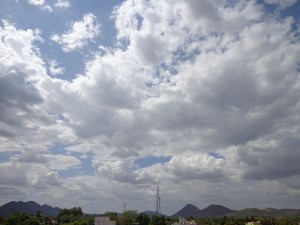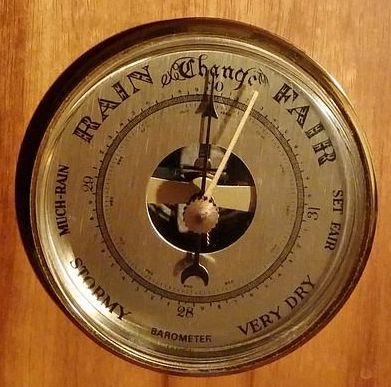
Air is mostly a mixture of gases and plus water vapor. The primary two gases are nitrogen and oxygen. We will state up front that the traces of other substances in air don’t affect the outcome of whether wet air or dry air is heavier. It all has to do with molecular weights.
Nitrogen
Nitrogen is a diatomic gas—chemical formula N₂. Its atomic weight is 14, therefore its molecular weight is 28. Nitrogen constitutes 78% of the atmosphere.

Oxygen
Oxygen is also a diatomic gas—chemical formula O₂. Its atomic weight is 16, therefore its molecular weight is 32. Oxygen constitutes 21% of the atmosphere.
Dry Air
Again, not considering the traces of other substances in dry air, its molecular weight is calculated using percentages.
28(0.78) + 32(0.21) = 21.84 + 6.72 = 28.56
Water Vapor
Water is written H₂O, since it is made up of two atoms of hydrogen plus one atom of oxygen. Hydrogen’s atomic number is 1, therefore, since there are two of them, the molecular weight of water is,
16 + (2)1 = 18.
Moist Air
Moist air has a lower molecular weight than dry air does. By way of proof, consider the molecular weight the air would have if it contained 10 percent water vapor. The calculation using percentages is,
28.56(0.90) + 18(0.10) = 27.50
Wet Air or Dry Air?
Which weighs more – wet air or dry air? Since 27.50 is less than 28.56, air with 10 percent water vapor in it (or, indeed, any amount) weighs less than dry air. For most people, this is counter intuitive. Perhaps that is because wet air is less refreshing. Drier air picks up more moisture from lung tissue, cooling those tissues to a greater degree, after all.
Note: You might also enjoy Pilewort: Wildflower or Weed? Practical Value?
References:

The reading of a barometer usually goes up in drier weather. The pressure is higher. This is what one might expect if the air is heavier, as dry air is.
Molecular weight :
N₂ : 28 O₂ : 32
Composition of Atmospheric air :
N₂ : 78 O₂ : 21
[The author made a typo, using 25% for oxygen.]
Thank you for spotting the typo. It has been corrected (the conclusion, of course, remains the same).- Vince.
Oxygen constitutes 21% of the atmosphere. You accidentally typed nitrogen.
Right you are. Getting old, I guess…